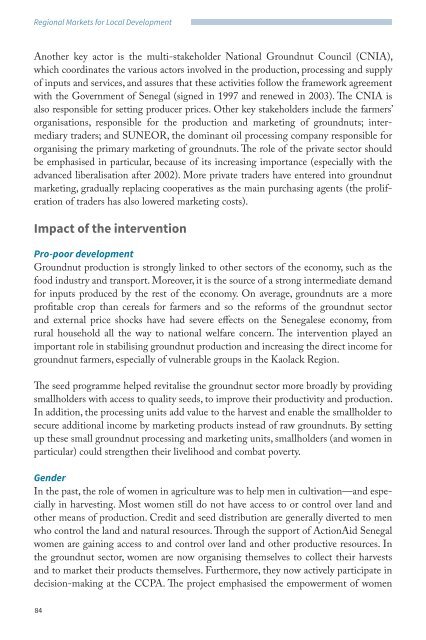Regional Markets
56ec00c44c641_local-markets-book_complete_LR
56ec00c44c641_local-markets-book_complete_LR
You also want an ePaper? Increase the reach of your titles
YUMPU automatically turns print PDFs into web optimized ePapers that Google loves.
<strong>Regional</strong> <strong>Markets</strong> for Local Development<br />
Another key actor is the multi-stakeholder National Groundnut Council (CNIA),<br />
which coordinates the various actors involved in the production, processing and supply<br />
of inputs and services, and assures that these activities follow the framework agreement<br />
with the Government of Senegal (signed in 1997 and renewed in 2003). The CNIA is<br />
also responsible for setting producer prices. Other key stakeholders include the farmers’<br />
organisations, responsible for the production and marketing of groundnuts; intermediary<br />
traders; and SUNEOR, the dominant oil processing company responsible for<br />
organising the primary marketing of groundnuts. The role of the private sector should<br />
be emphasised in particular, because of its increasing importance (especially with the<br />
advanced liberalisation after 2002). More private traders have entered into groundnut<br />
marketing, gradually replacing cooperatives as the main purchasing agents (the proliferation<br />
of traders has also lowered marketing costs).<br />
Impact of the intervention<br />
Pro-poor development<br />
Groundnut production is strongly linked to other sectors of the economy, such as the<br />
food industry and transport. Moreover, it is the source of a strong intermediate demand<br />
for inputs produced by the rest of the economy. On average, groundnuts are a more<br />
profitable crop than cereals for farmers and so the reforms of the groundnut sector<br />
and external price shocks have had severe effects on the Senegalese economy, from<br />
rural household all the way to national welfare concern. The intervention played an<br />
important role in stabilising groundnut production and increasing the direct income for<br />
groundnut farmers, especially of vulnerable groups in the Kaolack Region.<br />
The seed programme helped revitalise the groundnut sector more broadly by providing<br />
smallholders with access to quality seeds, to improve their productivity and production.<br />
In addition, the processing units add value to the harvest and enable the smallholder to<br />
secure additional income by marketing products instead of raw groundnuts. By setting<br />
up these small groundnut processing and marketing units, smallholders (and women in<br />
particular) could strengthen their livelihood and combat poverty.<br />
Gender<br />
In the past, the role of women in agriculture was to help men in cultivation—and especially<br />
in harvesting. Most women still do not have access to or control over land and<br />
other means of production. Credit and seed distribution are generally diverted to men<br />
who control the land and natural resources. Through the support of ActionAid Senegal<br />
women are gaining access to and control over land and other productive resources. In<br />
the groundnut sector, women are now organising themselves to collect their harvests<br />
and to market their products themselves. Furthermore, they now actively participate in<br />
decision-making at the CCPA. The project emphasised the empowerment of women<br />
84


